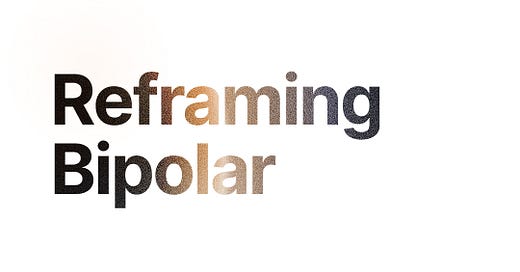Reframing Bipolar Disorder: From Symptom Management to Root-Level Healing
For the longest time, I tried to fit bipolar disorder into the Spiral Dynamics framework. No matter how hard I squeezed, it wouldn't quite fit. Spiral Dynamics beautifully explains the evolution of consciousness, but bipolarity stubbornly refused to be fully explained through this lens alone.
I only came closer to understanding bipolar disorder when I myself went through a rough patch (to say the least) and started displaying bipolar tendencies —when I learned how to truly listen to my body through Vipassana meditation.
I discovered that my ups and downs weren't evidence of being broken. Instead, they were a direct reflection of internal blockages—like water struggling through clogged pipes, creating unpredictable bursts of energy and sudden stagnation.
Understanding Bipolar Disorder as Energy Blockages
Bipolar disorder is traditionally described as extreme fluctuations between high-energy (manic) and low-energy (depressive) states. But from an energetic perspective, these extremes occur because the natural, steady flow of energy is blocked. Trauma, suppressed emotions, and internal conflicts are the common culprits clogging the pipes of our bodies and minds.
Imagine continuously holding back emotions, needs, or authentic expressions—eventually, the pressure builds until something bursts. These blockages are the root cause of bipolar patterns, not merely genetics or a chemical imbalance. While medication like lithium can help stabilize symptoms, it does not address this root cause. It's akin to patching leaks without unclogging the pipes.
Breaking Free: Accountability and Root-Level Change
First, understand this clearly: you're not broken. Believing you're broken strips you of accountability—the exact quality needed for genuine transformation. Your suffering, mood swings, and instability are signals that your system is functioning exactly as it should, given your internal state. Pain isn't malfunction; it's vital information.
As I've written before, we often approach personal change using the wrong tools—like trying to remove screws with a hammer. Going for the symptom instead of the root cause. When this inevitably fails, we assume we're defective. But it's not you—it's the approach. Real change happens at the root. Bipolarity is no different.
The Spiral of Bipolarity: Awareness and Energy
A bipolar individual's relationship with their energy tends to spiral, especially because they are initially unaware of their energy body and blockages—otherwise, they wouldn’t have placed them there in the first place. Blocked energy creates unpredictable ups and downs. Each manic or depressive episode is compounded by reactive energy—fear, excitement, dread—further clogging your internal system. Substances like alcohol or cannabis amplify these spirals, accelerating the destructive momentum.
Breaking this spiral means cultivating a deep awareness of your internal energy state. It requires tuning in—not avoiding—your sensations, emotions, and bodily states.
Vipassana Meditation: The Key to True Healing
Vipassana meditation directly addresses these root-level blockages. It isn't quick, easy, or always pleasant. It demands accountability, honesty, and determination. But it's also profoundly transformative.
I've meditated while on lithium, and it worked remarkably well. Some of my most powerful meditation sessions happened during this time. Medication can support you temporarily by stabilizing symptoms, providing the clarity and stability needed to delve deeper into meditation and root-level healing.
However, the Vipassana organization often restricts individuals openly labeled as bipolar from attending their retreats, out of liability concerns—a frustrating policy that contradicts the compassionate essence of the Buddha's teachings. If you choose to pursue this, be aware that your openness about bipolar diagnoses could pose challenges.
Addressing Dogma and Empirical Reality in Vipassana
Some people question whether Vipassana meditation retreats (meditation bootcamps) are dogmatic. I can only speak from my experience with the Dhamma nonprofit organization. After over 1000 hours of meditation practice, I've observed these teachings to be empirical rather than ideological. Vipassana meditation isn't a quick fix—it demands consistent effort. However, it doesn't require blind faith. The fact that it's not an instant cure, and that no one asks you to believe anything before seeing actual progress, should feel like a fresh breeze.
True change requires sustained practice to rewire deeply entrenched patterns. Vipassana strips away dogma, focusing purely on meditation techniques—the same method Buddha taught thousands of years ago, preserved through 50 generations by monks in Burma. Now freely available worldwide, this technique isn't mystical; it’s the most natural process I’ve discovered, and I'm profoundly grateful for it.
Healing as Empowerment
Real healing is never handed to you. There's no magic pill that permanently unclogs your pipes, precisely because you haven't yet learned how to manage your energy consciously. You must experience firsthand how your blockages formed and learn, step-by-step, to release them.
Your work won't earn sympathy points or special recognition. But it will earn you something infinitely more valuable: genuine freedom. You'll start noticing subtle shifts—fewer extreme fluctuations, more consistent clarity and emotional stability.
It's not complicated, but it is difficult. You alone are responsible for unraveling the knots you've unconsciously tied within yourself.
Practical Steps Forward:
Maintain Medication: Don't abruptly stop medication; it provides stability as you deepen your meditation practice.
Practice Vipassana Meditation: Sign up to a 10-day meditation bootcamp. It’s free.
Avoid Escalating Substances: Minimize or eliminate drugs like alcohol, cannabis, or stimulants that exacerbate internal spirals.
Cultivate Awareness: Regularly check in with your body, noticing sensations and emotions without judgment or avoidance.
Patience and Self-Compassion: Recognize your progress as subtle, incremental shifts rather than overnight transformations.
This blogpost went through bipolar being
Final Thoughts
You're not broken, nor are you a victim of circumstance. You're a capable being experiencing an internal imbalance that you have the power—and responsibility—to heal. I dare you to go to the root cause and heal.
"The tree that reaches to heaven has its roots in hell." - Carl Jung
The very struggles you've faced are fertile ground for profound healing and authentic growth.
”Use your access to the present moment as voting opportunities to becoming the person you want to become. You can even use the present moment to vote towards becoming present more often by investing in activities that strengthens your relationship to the present.”




